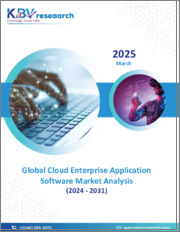
|
시장보고서
상품코드
1423738
기업 컨텐츠 관리(ECM) 시장 예측(-2030년) : 구성요소별, 전개별, 기업 규모별, 최종사용자별, 지역별 세계 분석Enterprise Content Management (ECM) Market Forecasts to 2030 - Global Analysis By Component (Solution and Services), Deployment (On-premise and Cloud), Enterprise Size, End User and By Geography |
||||||
세계 기업 컨텐츠 관리(ECM) 시장 규모는 2023년 246억 달러에 달하고, 2030년에는 544억 달러에 달할 것으로 예측됩니다.
기업 컨텐츠 관리(ECM)는 생성부터 보관, 폐기까지 전체 라이프사이클에 걸쳐 조직의 디지털 컨텐츠를 체계적으로 관리하는 것을 의미하며, ECM 시스템은 문서 보존 정책을 시행하고 감사 추적을 제공함으로써 조직이 규제 요건을 준수할 수 있도록 지원합니다. 준수할 수 있도록 지원합니다.
Association for Intelligent Information Management(AIIM)에 따르면, 약 52%의 조직이 3개 이상의 ECM/DM/RM 시스템을 도입하고 있으며, 약 22%의 조직이 5개 이상의 시스템을 도입한 것으로 나타났습니다.
AI 통합 ECM의 성장 추세
기업 컨텐츠 관리는 문서에서 데이터를 '읽는' 능력을 가진 인공지능(AI)에 의해 강화되고 있으며, AI 기반 ECM 시스템은 컨텐츠를 분류, 분류, 분석하여 다양한 형태로 정보를 제공할 수 있습니다. 또한 머신러닝, 이미지 인식, 음성 인식 및 전사, 자연어 처리(NLP), 자연어 이해(NLU) 등 AI 기반 기술이 AI 통합 ECM의 트렌드를 주도하고 있습니다. 따라서 AI 통합 ECM의 증가 추세는 시장 수요를 촉진하는 중요한 요인이 되고 있습니다.
데이터 보안에 대한 오해
보안과 컴플라이언스는 전 세계 모든 조직에서 가장 큰 관심사이며, 이러한 조직은 데이터 처리와 한 플랫폼에서 다른 플랫폼으로의 데이터 마이그레이션을 수반하는 새로운 솔루션 채택을 꺼려합니다. 기업 컨텐츠 관리는 한 채널에서 다른 채널로 데이터를 수집하고 전송하는 것을 포함합니다. 또한, 보안 프레임워크와 그 적용에 대한 이해가 부족하여 많은 기업들이 기업 컨텐츠 관리 솔루션이 고도로 추상화된 데이터 세트에 대한 데이터 유출을 유발할 수 있다고 생각하여 시장에서의 입지를 강화하는 데 어려움을 겪고 있습니다.
워크플로우 자동화에 대한 요구
ECM 시스템 내 워크플로우 자동화는 사전 정의된 프로세스를 통해 컨텐츠 이동을 간소화하고, 수작업을 줄이고, 오류를 최소화하며, 작업 완료 시간을 단축하는 등 ECM의 워크플로우 자동화 통합은 컨텐츠 처리 속도를 향상시킬 뿐만 아니라 다양한 이해관계자의 원활한 협업을 보장합니다. 다양한 이해관계자 간의 원활한 협업을 보장하여 협업을 촉진합니다. 따라서 워크플로우 자동화에 대한 수요는 시장 확대를 가속화하는 중요한 요인이 되고 있습니다.
숙련공의 부족
문서 관리, 워크플로우 자동화, 정보 거버넌스 등 ECM 시스템은 복잡하기 때문에 전문적인 기술이 필요합니다. 이러한 숙련된 인력의 부족은 ECM 솔루션의 구현, 커스터마이징, 유지보수에 장애가 되고, 이러한 시스템을 다양한 비지니스 환경에 원활하게 통합하는 데 방해가 됩니다. 그 결과, 기업은 ECM 기능의 지연, 비용 증가, 최적의 ECM 기능 활용에 어려움을 겪을 수 있습니다. 이러한 요인들이 시장 성장을 저해하는 요인으로 작용하고 있습니다.
COVID-19의 영향
기업 컨텐츠 관리(ECM) 분야는 COVID-19 팬데믹으로 인해 심각한 타격을 입었습니다. 조직은 원격 근무가 새로운 표준으로 진화함에 따라 디지털 컨텐츠를 효과적으로 관리하고 배포하는 ECM 솔루션에 대한 요구가 증가했습니다. 팬데믹으로 인해 클라우드 기반 ECM 시스템이 대중화되면서 접근성과 팀워크의 가치가 부각되었습니다. 또한, 보안에 대한 우려와 컴플라이언스 요구사항이 급증하면서 원격 근무 환경에서 데이터 프라이버시와 규정 준수를 보장하는 ECM 플랫폼의 필요성이 부각되었습니다.
예측 기간 동안 서비스 분야가 가장 큰 비중을 차지할 것으로 예상
ECM 솔루션의 원활한 작동을 위한 전문적인 매니지드 서비스의 필요성으로 인해 서비스 분야가 가장 큰 비중을 차지할 것으로 추정됩니다. 이러한 서비스는 도입 실패로 인한 비용과 시간 낭비를 방지하기 위해 ECM 환경의 개발, 평가 및 활용을 지원합니다. 또한, 이러한 서비스는 업무 절차의 유효성을 유지하고, 기업의 확장을 촉진하며, 불필요한 운영 비용을 절감하는 데 필요한 지원을 제공합니다.
예측 기간 동안 가장 높은 CAGR을 기록할 것으로 예상되는 분야는 헬스케어 부문입니다.
헬스케어 분야는 예측 기간 동안 유리한 성장세를 보일 것으로 예상됩니다. 헬스케어 조직은 방대한 양의 민감한 환자 데이터, 복잡한 워크플로우, 엄격한 규제 요건을 다루고 있으며, ECM 솔루션은 의료 문서와 기록을 안전하게 저장, 검색 및 관리할 수 있는 종합적인 프레임워크를 제공함으로써 이러한 조직에 필수적인 도구가 되고 있습니다. 의료 산업에서 ECM 시스템은 전자 의료 기록(EHR)과의 원활한 통합을 촉진하여 의료진이 중요한 환자 정보에 빠르게 접근할 수 있도록 지원합니다.
최대 시장 점유율을 차지하는 지역
아시아태평양은 예측 기간 동안 가장 큰 시장 점유율을 차지할 것으로 예상되는데, 이는 새로운 기술 도입이 활발하고 역동적이기 때문입니다. 이 지역의 조직들이 IT 지출을 점진적으로 늘리고 있기 때문에 ECM 소프트웨어 솔루션의 채택이 증가할 것으로 예상됩니다. 중국, 일본, 호주 및 뉴질랜드(ANZ)는 기업 컨텐츠 관리 소프트웨어 솔루션 및 서비스 도입의 주요 국가로, 이 지역의 시장 수요를 촉진하고 있습니다.
CAGR이 가장 높은 지역
북미 지역은 기술력과 효율적인 정보 관리의 필요성으로 인해 예측 기간 동안 수익성 있는 성장을 이룰 것으로 예상됩니다. 엄격한 규제 프레임워크의 확산과 워크플로우 간소화 및 데이터 보안 강화에 대한 조직의 요구가 증가하면서 ECM 솔루션의 채택을 촉진하고 있습니다. 이 지역에는 금융, 의료, 법률 등 다양한 산업 분야가 존재하며, 각 분야는 ECM 애플리케이션에 대한 수요를 촉진하고 있습니다.
목차
제1장 주요 요약
제2장 서문
- 개요
- 이해관계자
- 조사 범위
- 조사 방법
- 정보 출처
제3장 시장 동향 분석
- 성장 촉진요인
- 성장 억제요인
- 기회
- 위협
- 최종사용자 분석
- 신흥 시장
- COVID-19의 영향
제4장 Porter's Five Forces 분석
- 공급 기업의 교섭력
- 구매자의 교섭력
- 대체품의 위협
- 신규 참여업체의 위협
- 경쟁사간 경쟁 관계
제5장 세계의 기업 컨텐츠 관리(ECM) 시장 : 컴포넌트별
- 솔루션
- 서비스
제6장 세계의 기업 컨텐츠 관리(ECM) 시장 : 전개별
- 온프레미스
- 클라우드
제7장 세계의 기업 컨텐츠 관리(ECM) 시장 : 기업 규모별
- 대기업
- 중소기업
제8장 세계의 기업 컨텐츠 관리(ECM) 시장 : 최종사용자별
- 헬스케어
- 미디어·엔터테인먼트
- 은행, 금융기관, 보험
- 통신·IT
- 기타 최종사용자
제9장 세계의 기업 컨텐츠 관리(ECM) 시장 : 지역별
- 북미
- 미국
- 캐나다
- 멕시코
- 유럽
- 독일
- 영국
- 이탈리아
- 프랑스
- 스페인
- 기타 유럽
- 아시아태평양
- 일본
- 중국
- 인도
- 호주
- 뉴질랜드
- 한국
- 기타 아시아태평양
- 남미
- 아르헨티나
- 브라질
- 칠레
- 기타 남미
- 중동 및 아프리카
- 사우디아라비아
- 아랍에미리트
- 카타르
- 남아프리카공화국
- 기타 중동 및 아프리카
제10장 주요 발전
- 계약, 파트너십, 협업, 합작투자
- 인수와 합병
- 신제품 발매
- 사업 확대
- 기타 주요 전략
제11장 기업 개요
- Microsoft Corporation
- Oracle Corporation
- Newgen Software
- International Business Machines(IBM) Corporation
- M-Files Corporation
- Hewlett Packard Enterprise(HPE) Company
- OpenText Corporation
- Hyland Software Inc.
- Alfresco Software Inc.
- Adobe Systems Incorporated
- Xerox Corporation
According to Stratistics MRC, the Global Enterprise Content Management (ECM) Market is accounted for $24.6 billion in 2023 and is expected to reach $54.4 billion by 2030 growing at a CAGR of 12% during the forecast period. Enterprise Content Management (ECM) refers to the systematic management of an organization's digital content throughout its lifecycle, from creation to archival or disposal. ECM systems help organizations adhere to regulatory requirements by enforcing document retention policies and providing audit trails.
According to Association for Intelligent Information Management (AIIM), around 52% of organizations have three or more than three ECM/DM/RM systems and around 22% of organizations have five or more than five systems.
Market Dynamics:
Driver:
Rising trend of AI-integrated ECM
Enterprise content management is enhanced by artificial intelligence (AI), which has the capacity to "read" data from a document. An AI-powered ECM system can categorize, classify, analyze content, and deliver information in various different forms. Additionally, AI-based technologies such as machine learning, image recognition, voice recognition and transcription, natural language processing (NLP), and natural language understanding (NLU) are driving the trends for AI-integrated ECM. Therefore, the rising trend of AI-integrated ECM is a significant factor propelling market demand.
Restraint:
Misconceptions related to data security
Security and compliance are the primary concerns of organizations across the globe, and these organizations are reluctant to adopt new solutions that involve data handling or shifting data from one platform to another. Enterprise content management involves data collection and transmission from one channel to another. Moreover, due to an inadequate understanding of security frameworks and their applications, a lot of businesses believe that enterprise content management solutions could cause data breaches in their highly abstracted data sets, which hinders them from growing their market position.
Opportunity:
Demand for workflow automation
Workflow automation within ECM systems streamlines the movement of content through predefined processes, reducing manual intervention, minimizing errors, and accelerating task completion. ECM's integration of workflow automation not only enhances the speed of content processing but also fosters collaboration by ensuring seamless coordination among various stakeholders. Therefore, demand for workflow automation is a significant driver accelerating market expansion.
Threat:
Lack of skilled workers
The complexity of ECM systems, encompassing document management, workflow automation, and information governance, necessitates a specialized skill set. This dearth of skilled workers leads to obstacles in the implementation, customization, and maintenance of ECM solutions, hindering the seamless integration of these systems into diverse business environments. Consequently, organizations may face delays, increased costs, and suboptimal utilization of ECM functionalities. These factors hamper market growth.
Covid-19 Impact
The Enterprise Content Management (ECM) sector was severely impacted by the COVID-19 pandemic. Organizations faced a growing need for ECM solutions to effectively manage and distribute digital content as remote work evolved into the new standard. Cloud-based ECM systems have become more popular as a result of the pandemic, which has highlighted the value of accessibility and teamwork. In addition, security concerns and compliance requirements surged, highlighting the need for ECM platforms to ensure data privacy and regulatory compliance in a remote work environment.
The services segment is expected to be the largest during the forecast period
The services segment is estimated to hold the largest share, due to the need for professional and managed services to ensure the smooth functioning of ECM solutions. In order to prevent spending money and time on an unsuccessful implementation, these services help with the development, evaluation, and utilization of ECM environments. Furthermore, these services offer the assistance required to maintain the effectiveness of business procedures, spur enterprise expansion, and cut down on unnecessary operating costs.
The healthcare segment is expected to have the highest CAGR during the forecast period
The healthcare segment is anticipated to have lucrative growth during the forecast period. Healthcare organizations deal with vast amounts of sensitive patient data, intricate workflows, and stringent regulatory requirements. ECM solutions become indispensable tools for these entities, providing a comprehensive framework for secure storage, retrieval, and management of healthcare documents and records. Within the healthcare landscape, ECM systems facilitate seamless integration with electronic health records (EHRs), enabling healthcare professionals to access critical patient information promptly.
Region with largest share:
Asia Pacific commanded the largest market share during the extrapolated period owing to the advanced and dynamic adoption of new technologies. The adoption of ECM software solutions is projected to increase as a result of the region's organizations gradually increasing their IT spending. China, Japan, and Australia and New Zealand (ANZ) are the leading countries in terms of the adoption of enterprise content management software solutions and services, which fuels market demand in this region.
Region with highest CAGR:
North America is expected to witness profitable growth over the projection period, owing to the region's technological prowess and the imperative for efficient information management. The prevalence of stringent regulatory frameworks, coupled with the escalating need for organizations to streamline workflows and enhance data security, has fuelled the adoption of ECM solutions. The region is characterized by a diverse industry landscape, including finance, healthcare, and legal sectors, each driving the demand for ECM applications.
Key players in the market
Some of the key players in the Enterprise Content Management (ECM) Market include Microsoft Corporation, Oracle Corporation, Newgen Software, International Business Machines (IBM) Corporation, M-Files Corporation, Hewlett Packard Enterprise (HPE) Company, Open Text Corporation, Hyland Software Inc., Alfresco Software Inc., Adobe Systems Incorporated and Xerox Corporation.
Key Developments:
In September 2023, Microsoft Corp. and Mercy are forging a long-term collaboration using generative AI and other digital technologies to give physicians, advance practice providers and nurses more time to care for patients and improve the patient experience.
In March 2023, Newgen Software, a key provider of low code-driven online transformation tools, announced the launch of Newgen OmniDocs Connector, an enterprise content management (ECM) solution, on its cloud market space. The initiative will enlarge the scope of demand for ECM solutions in the software industry.
In October 2022, Microsoft Corp. and Mercedes-Benz collaborate to make vehicle production more efficient, resilient and sustainable. With the new MO360 Data Platform, Mercedes-Benz is connecting its around 30 passenger car plants worldwide to the Microsoft Cloud, enhancing transparency and predictability across its digital production and supply chain.
In June 2022, Oracle announced partnership with Kyndryl, the world's largest IT infrastructure services provider, to help customers accelerate their journey to the cloud by delivering managed cloud solutions to enterprises around the world.
Components Covered:
- Solution
- Services
Deployments Covered:
- On-premise
- Cloud
Enterprise Sizes Covered:
- Large Enterprises
- Small & Medium Enterprises
End Users Covered:
- Healthcare
- Media & Entertainment
- Banking, Financial Institutions, and Insurance
- Telecom & IT
- Other End Users
Regions Covered:
- North America
- US
- Canada
- Mexico
- Europe
- Germany
- UK
- Italy
- France
- Spain
- Rest of Europe
- Asia Pacific
- Japan
- China
- India
- Australia
- New Zealand
- South Korea
- Rest of Asia Pacific
- South America
- Argentina
- Brazil
- Chile
- Rest of South America
- Middle East & Africa
- Saudi Arabia
- UAE
- Qatar
- South Africa
- Rest of Middle East & Africa
What our report offers:
- Market share assessments for the regional and country-level segments
- Strategic recommendations for the new entrants
- Covers Market data for the years 2021, 2022, 2023, 2026, and 2030
- Market Trends (Drivers, Constraints, Opportunities, Threats, Challenges, Investment Opportunities, and recommendations)
- Strategic recommendations in key business segments based on the market estimations
- Competitive landscaping mapping the key common trends
- Company profiling with detailed strategies, financials, and recent developments
- Supply chain trends mapping the latest technological advancements
Free Customization Offerings:
All the customers of this report will be entitled to receive one of the following free customization options:
- Company Profiling
- Comprehensive profiling of additional market players (up to 3)
- SWOT Analysis of key players (up to 3)
- Regional Segmentation
- Market estimations, Forecasts and CAGR of any prominent country as per the client's interest (Note: Depends on feasibility check)
- Competitive Benchmarking
- Benchmarking of key players based on product portfolio, geographical presence, and strategic alliances
Table of Contents
1 Executive Summary
2 Preface
- 2.1 Abstract
- 2.2 Stake Holders
- 2.3 Research Scope
- 2.4 Research Methodology
- 2.4.1 Data Mining
- 2.4.2 Data Analysis
- 2.4.3 Data Validation
- 2.4.4 Research Approach
- 2.5 Research Sources
- 2.5.1 Primary Research Sources
- 2.5.2 Secondary Research Sources
- 2.5.3 Assumptions
3 Market Trend Analysis
- 3.1 Introduction
- 3.2 Drivers
- 3.3 Restraints
- 3.4 Opportunities
- 3.5 Threats
- 3.6 End User Analysis
- 3.7 Emerging Markets
- 3.8 Impact of Covid-19
4 Porters Five Force Analysis
- 4.1 Bargaining power of suppliers
- 4.2 Bargaining power of buyers
- 4.3 Threat of substitutes
- 4.4 Threat of new entrants
- 4.5 Competitive rivalry
5 Global Enterprise Content Management (ECM) Market, By Component
- 5.1 Introduction
- 5.2 Solution
- 5.2.1 Mobile Content Management
- 5.2.2 Records Management
- 5.2.3 Document Management
- 5.2.4 Case Management
- 5.2.5 Web Content Management
- 5.2.6 Imaging and Capturing
- 5.2.7 Digital Asset Management
- 5.2.8 Other Solutions
- 5.3 Services
- 5.3.1 Managed
- 5.3.2 Professional
6 Global Enterprise Content Management (ECM) Market, By Deployment
- 6.1 Introduction
- 6.2 On-premise
- 6.3 Cloud
7 Global Enterprise Content Management (ECM) Market, By Enterprise Size
- 7.1 Introduction
- 7.2 Large Enterprises
- 7.3 Small & Medium Enterprises
8 Global Enterprise Content Management (ECM) Market, By End User
- 8.1 Introduction
- 8.2 Healthcare
- 8.3 Media & Entertainment
- 8.4 Banking, Financial Institutions, and Insurance
- 8.5 Telecom & IT
- 8.6 Other End Users
9 Global Enterprise Content Management (ECM) Market, By Geography
- 9.1 Introduction
- 9.2 North America
- 9.2.1 US
- 9.2.2 Canada
- 9.2.3 Mexico
- 9.3 Europe
- 9.3.1 Germany
- 9.3.2 UK
- 9.3.3 Italy
- 9.3.4 France
- 9.3.5 Spain
- 9.3.6 Rest of Europe
- 9.4 Asia Pacific
- 9.4.1 Japan
- 9.4.2 China
- 9.4.3 India
- 9.4.4 Australia
- 9.4.5 New Zealand
- 9.4.6 South Korea
- 9.4.7 Rest of Asia Pacific
- 9.5 South America
- 9.5.1 Argentina
- 9.5.2 Brazil
- 9.5.3 Chile
- 9.5.4 Rest of South America
- 9.6 Middle East & Africa
- 9.6.1 Saudi Arabia
- 9.6.2 UAE
- 9.6.3 Qatar
- 9.6.4 South Africa
- 9.6.5 Rest of Middle East & Africa
10 Key Developments
- 10.1 Agreements, Partnerships, Collaborations and Joint Ventures
- 10.2 Acquisitions & Mergers
- 10.3 New Product Launch
- 10.4 Expansions
- 10.5 Other Key Strategies
11 Company Profiling
- 11.1 Microsoft Corporation
- 11.2 Oracle Corporation
- 11.3 Newgen Software
- 11.4 International Business Machines (IBM) Corporation
- 11.5 M-Files Corporation
- 11.6 Hewlett Packard Enterprise (HPE) Company
- 11.7 OpenText Corporation
- 11.8 Hyland Software Inc.
- 11.9 Alfresco Software Inc.
- 11.10 Adobe Systems Incorporated
- 11.11 Xerox Corporation



















